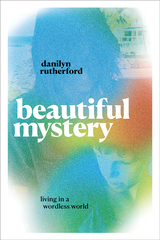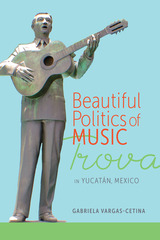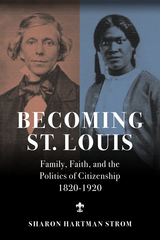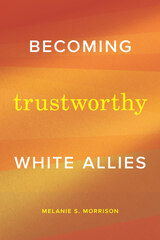
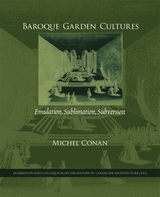
Baroque Garden Cultures: Emulation, Sublimation, Subversion proposes a new approach to the study of baroque gardens, examining the social reception of gardens as a means to understand garden culture in general and exploring baroque gardens as a feature of baroque cultures in particular. In so doing, it negotiates a turning point in garden history.
Jose Antonio Maravall determined that baroque culture grew out of the social and economic crises of the seventeenth and eighteenth centuries, precipitating the establishment of the state and its concomitant engines of repression and propaganda. This absolutist state deployed the arts as a political means to dazzle society into submission to the monarch. The varying degrees of state control allowed for diverse cultural and political reception of the arts to emerge and for the possibility of anti-baroque arts to develop alongside baroque ones. This possibility invites us to understand the conditions of artistic production as a preamble to aesthetic criticism and to position garden history within the framework of social history. Such an approach explores and explains the vexing differences in baroque art and landscape architecture in different countries and at different times from the end of the sixteenth century to the present. Although primarily associated with Europe, baroque culture developed elsewhere as well.
Gardens played a prominent role in the development of the European baroque, with variations due to the different political systems and social structures in place between 1580 and 1770. These countries nevertheless entertained a dense network of cultural relationships and the reception of baroque gardens can thus be studied in an international context.
This study of gardens ranging from western and northern Europe in the seventeenth and eighteenth centuries to as far away as twelfth-century China shows how the study of audience reception can renew our understanding of the cultural role of gardens. Gardens have a life of their own and this book’s various chapters ponder how they might have been formative of culture in a way that completely escaped the intentions of their creators and designers. This volume also studies the changing reception of gardens long after they were designed, including the reception of historical gardens by contemporary tourists and art critics. Baroque Garden Cultures demonstrates that while baroque garden politics encouraged emulation and led to various forms of sublimation of its attempts at cultural control, it could not ultimately escape clever means of subversion.

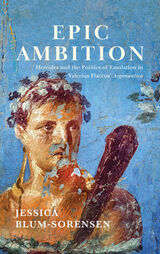
Focusing especially on Hercules, Blum-Sorensen explores how Valerius’ characters—and, by extension, their Roman audience—misinterpret exemplars of past achievement, or apply them to sad effect in changed circumstances. By reading such models as normative guides to epic triumph, Valerius’ Argonauts find themselves enacting tragic outcomes: effectively, the characters impose their nostalgic longing for epic triumph on the events before them, even as Valerius and his audience anticipate the tragedy awaiting his heroes. Valerius thus questions Rome’s reliance on the past as a guide to the present, allowing for doubt about the empire’s success under the new Flavian regime. It is the literary tradition’s exchange between triumphant epic and tragedy that makes the Argo’s voyage a perfect vehicle for Valerius’ exploration: the tensions between genres both raise and prohibit resolution of anxieties about how the new age—mythological or real—will turn out.
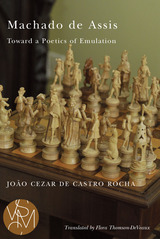
At the center of this alternative explanation, Castro Rocha situates the fallout from the success enjoyed by Eça de Queirós with the publication of Cousin Basílio and Machado’s two long texts condemning the author and his work. Literary and aesthetic rivalries come to the fore, allowing for a new theoretical framework based on a literary appropriation of “thick description,” the method proposed by anthropologist Clifford Geertz. From this method, Castro Rocha derives his key hypothesis: an unforeseen consequence of Machado’s reaction to Eça’s novel was a return to the classical notion of aemulatio, which led Machado to develop a “poetics of emulation.”

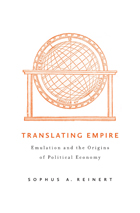
Historians have traditionally used the discourses of free trade and laissez faire to explain the development of political economy during the Enlightenment. But from Sophus Reinert’s perspective, eighteenth-century political economy can be understood only in the context of the often brutal imperial rivalries then unfolding in Europe and its former colonies and the positive consequences of active economic policy. The idea of economic emulation was the prism through which philosophers, ministers, reformers, and even merchants thought about economics, as well as industrial policy and reform, in the early modern period. With the rise of the British Empire, European powers and others sought to selectively emulate the British model.
In mapping the general history of economic translations between 1500 and 1849, and particularly tracing the successive translations of the Bristol merchant John Cary’s seminal 1695 Essay on the State of England, Reinert makes a compelling case for the way that England’s aggressively nationalist policies, especially extensive tariffs and other intrusive market interventions, were adopted in France, Italy, Germany, and Scandinavia before providing the blueprint for independence in the New World. Relatively forgotten today, Cary’s work served as the basis for an international move toward using political economy as the prime tool of policymaking and industrial expansion.
Reinert’s work challenges previous narratives about the origins of political economy and invites the current generation of economists to reexamine the foundations, and future, of their discipline.
READERS
Browse our collection.
PUBLISHERS
See BiblioVault's publisher services.
STUDENT SERVICES
Files for college accessibility offices.
UChicago Accessibility Resources
home | accessibility | search | about | contact us
BiblioVault ® 2001 - 2025
The University of Chicago Press


